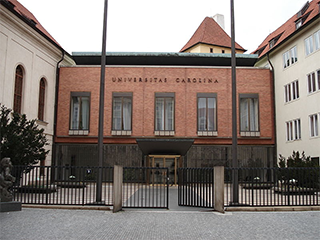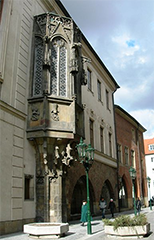Host Institution
In its dual capacity as proponent and host institution of this IP, Charles University in Prague (Univerzita Karlova v Praze), through its Faculty of Arts (Filozofická fakulta), will take responsibility for the programme’s logistics and give its particular contribution to the course’s academic programme:
- Logistics: the Faculty of Arts will provide adequate spaces and facilities for the study and teaching activities in the programme to be fully carried out in the course of its two weeks. This will include adequately equipped lecture and seminar rooms, full access to the Faculty’s libraries (covering both its conventional and electronic resources), and full inter and intranet access. Discharge of its organisational duties on the part of the Faculty of Arts will also include, prior to the course, providing assistance in securing adequate accommodation for staff and students; and, during the course, securing administrative support.
- Academic Role: as proponent of this programme, the Department of Anglophone Literatures and Cultures of the Faculty of Arts will actively contribute towards its full academic realisation, and will do so in ways that reflect its own experience in the IP’s specific field. Indeed, over its more than century-long history the Department has considerable experience teaching programmes based on Shakespeare and early modern literature. Among the former Department Heads, there are leading international Shakespeareans, Professor Zdeněk Stříbrný, D.Litt., and Professor Martin Hilský, MBE, the author of the first complete translation and annotated critical edition of Shakespeare’s work in Czech. In 2011 the Department organized the Ninth World Shakespeare Congress.

Charles University in Prague
was founded in 1348 and is one of the world’s oldest universities. more

hide

The Faculty of Arts
is a traditional centre of Czech scholarship. moreThe institution was established as the Faculty of Liberal Arts on the basis of the founding document of Charles IV of 7 April 1348. In doing so, the monarch strove to make the Kingdom of Bohemia an important centre of the Holy Roman Empire. Because it was the custom to first attend the Faculty of Liberal Arts, where students were educated chiefly in rhetoric and philosophy, the faculty became the University’s largest part and in 1366 it was endowed with the first college building, the Karolinum.
As a whole, the Faculty of Arts is extensively involved in trans-national co-operation, mostly within the Life Long Learning programmes. It participates in two Erasmus Mundus programmes, one of which, the Joint Doctorate TEEME (Text and Event in Early Modern Europe) is implemented by the Department of Anglophone Literatures and Cultures, in cooperation with the Department of World History. The international character of the Faculty of Arts confirmed by the breadth of its institutional contract, covering exchanges with every country in the EU and the diversity of its academic fields: Philology, including a wide range of Oriental Studies, History, Art History, Archaeology (especially of Ancient Egypt), Philosophy, Religion Studies, Informatics, New Media, Sociology, Pedagogy and Psychology.

hide
English Studies at Charles University
The beginnings of English Studies can be traced back to the division of Charles University into the Czech and the German parts in 1882. morehide







